|
One of the best gags in Stephen Chow's sometimes silly but often inventive and very funny 1994 James Bond parody, From Beijing with Love [Gwok chaan Ling Ling Chat], occurs in the opening minute. As a caption proclaiming that this film has absolutely no relation to James Bond dissolves into the film's opening shot, the soundtrack is graced by the instantly recognisable opening bars of Monty Norman's now iconic Bond theme*. Yes, co-directors Stephen Chow and Lee Lik-chi are taking the piss and believe me when I tell you that they're just getting started here.
In mainland China under cover of night, the army is escorting a large red lorry – one whose signage proclaims that it contains "Extra Strong Phallus Pills" – into a heavily guarded warehouse. When the soldiers break the seal and open the rear door, they are startled when a flock of pigeons flies out, one of which perches itself on the amused commanding officer's cap. "Where's the skull?" he then urgently asks after the lorry is shown to be otherwise empty. The wide shot that follows adds context to this statement, revealing as it does the still headless skeleton of a Tyrannosaurus Rex. We soon learn that the skull has somehow been hijacked and is currently being driven into a container warehouse in Taiyuan, where it's unloaded by a large and organised gang of armed hoods. Hiding inside the giant skull, however, is a government agent (Yu Rongguang), who proceeds to take down every one of the goons with whatever firearm comes to hand. He's just reporting in that he's recovered the skull and eliminated all hostiles when their boss appears, costumed in protective armour. The agent opens fire with a hail of bullets and even a grenade, but the man remains undamaged, then pulls out a single-shot golden gun (oh yes) whose special shells have all the devastating firepower of a military canon. The agent flees the warehouse and hides behind a shipping container to report his situation, but the helmet on the boss man's armour equips him with a Terminator-like ability to see through walls, and a second shot from the golden gun tears through everything in its path, including the seemingly concealed agent's chest.
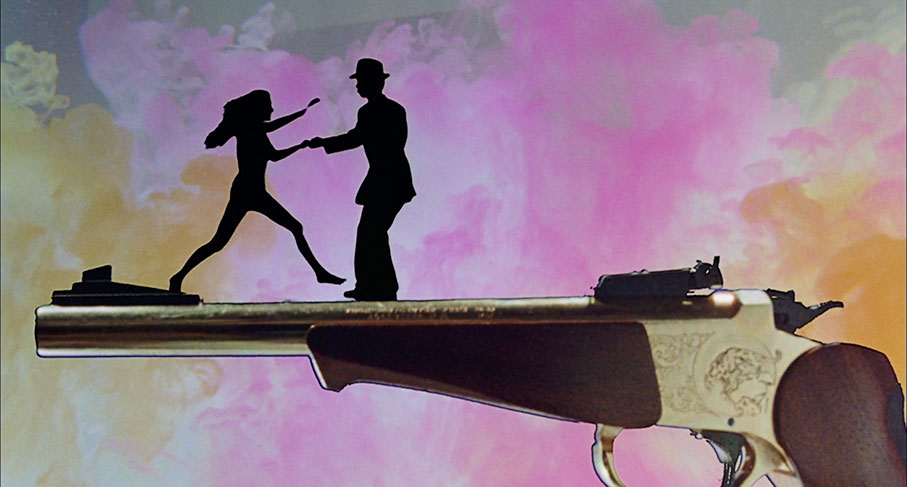
The next day at military headquarters, Commander Yuen (Wong Kam-kong) is admitting to the Premier that they currently still have no major leads and have a bit of a personnel problem as all of their best spies are now effectively dead. The importance of rescuing this grade-one national treasure is bellowed at him down the phone, and with his options narrowed, Yuen retrieves dirt-spattered personnel file from a basket of old documents due for disposal. When he asks why this file is in the basket, he is told that the man in question is a reserve agent that has been judged to be mentally and physically deficient. On reading his file, Yuen disagrees, noting that the man is descended from a martyr and is considered politically sound, and thus orders that he be brought in. The agent's name Ling Ling Chat (Stephen Chow), and while that may sound like a regular Chinese name to western viewers with little knowledge of Cantonese (mine is virtually non-existent), this name is Cantonese for a specific number. Want to guess which one? Yep, 007 is not this agent's assigned code number but his name.
If you thought that was pushing it, just wait until you see the opening titles, a gloriously cheesy parody of classic Bond main title sequences. Against a range of colourfully abstract backgrounds, matted silhouetted images appear of Chow's agent adopting a 007 ready-for-action pose, a woman dancing provocatively up against an outrageously phallic giant bullet, then waltzing with 007 on the barrel of the golden gun, all set to composer William Hu's cod-Bond theme. I'm not going to reveal how the dance concludes, but it had me choking on my coffee in amused disbelief at what 007 does. Chow then adopts the now poster image pose of Bond looking forward with his gun arm resting diagonally across his chest**. No relation to James Bond, my arse.
When we finally meet 007, he's working as a butcher at a local market and being addressed by a woman in a manner that suggests she has hunted high and low to find a man so remarkable that he is "like a firefly in the darkest black, so dazzling, so brilliant." The praise continues as 007 cuts pork with his sizeable chopper (steady on), before the woman is revealed not to be a dazzled admirer, but a sex worker pressing him to settle the previous night's bill. It's then that we get the first of a two glorious nods to the early films of Wong Kar-wai, as 007 lifts his martini to his lips in slow motion while locals scuttle past him at an accelerated speed, a spot-on parody of a memorable shot of Tony Leung's Cop 633 from Wong's 1994 Chunking Express [Chung Hing sam lam]. Later, we'll be treated to a sublime recreation of a final scene shot from that director's second feature, Days of Being Wild [Ah fei jing juen], complete with the very same background music.
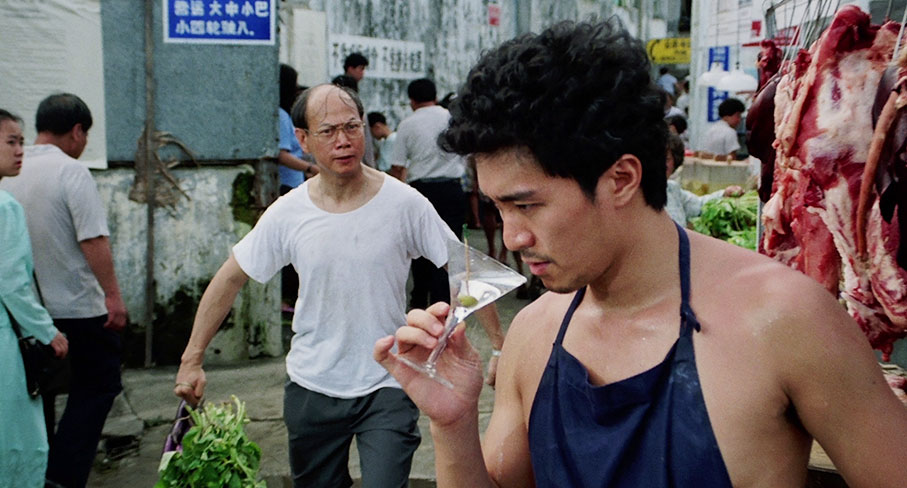
The man sent out to bring 007 back into the fold is Tat Man-sai (Law Kar-ying), a name that apparently translates as 'Da Vinci' but means something rather rude when shortened to Man-sai, something Da Vinci unsuccessfully does his best to discourage. The parodying and usurping of Bond tropes continues when 007 arrives at the ministry and enters the reception office of the film's Moneypenny replacement, Azalea (I've not been able to confirm who plays this role), whom the decade-absent 007 mistakes for her mother Rose, a nod to the 1967 Bond parody, Casino Royale. Instead of the classy suits sported by the various incarnations of Bond, 007 arrives topless in his butcher's apron and sporting a straw hat, which he casually tosses over his shoulder and which lands on the hatstand behind him with such accuracy (it even slides down to fix itself on a hook by its chinstrap) that it had me leaping for the rewind button. He also has his ever-present butcher's knife strapped to his waist in a leather scabbard, and a cigarette dangling lazily from his mouth, which becomes his signature motif and remains stubbornly in place whatever the situation. There's a sign of changing times with Azalea's cleavage and 007's reaction to it, but the sequence concludes with a slapstick gag so unexpected that it once again had me guffawing uncontrollably.
Here we learn that Man-sai is this film's stand-in for famed Bond quartermaster Q, but a largely hopeless one who spends government funding coming up with the dopiest of gadgets. These include a solar-powered torch that only works while it's sensor is being exposed to light – such as the light from a regular battery-powered torch – and an attaché case that transforms into a "superspy stool" for sitting and observing the enemy for long periods of time. 007 is certainly pleased to be called back to duty after ten years away, but is casually insulted when the Commander tells him encouragingly, "Even a piece of toilet paper or a pair of underwear has its uses," to which an unflustered 007 responds, "A perfect analogy."
After 007 has been given his assignment ("Any questions?" "Can I sit this one out?" "No!") and sent on his way, Yuen's fellow Commander Chen (Yip Chun) expressed his contempt with his colleague's choice of operative and announces that he intends to send his own agents to investigate. As he walks to the door, Yuen smilingly bids him goodbye, only for his loyal secretary, Lee Heung-kam (Anita Yuen), to step forward and coldly drive a spike into Chen's head. Yuen then pulls out his golden gun and fires a bullets that incinerates Chen's body from existence (despite the violence, this sequence includes one of my favourite sight gags in the film, one I'm not going to spoil here). Yuen then hands a file to Heung-kam, which she orders her to take to Hong Kong and to hand to 007, then to choose a convenient moment to dispose of him.
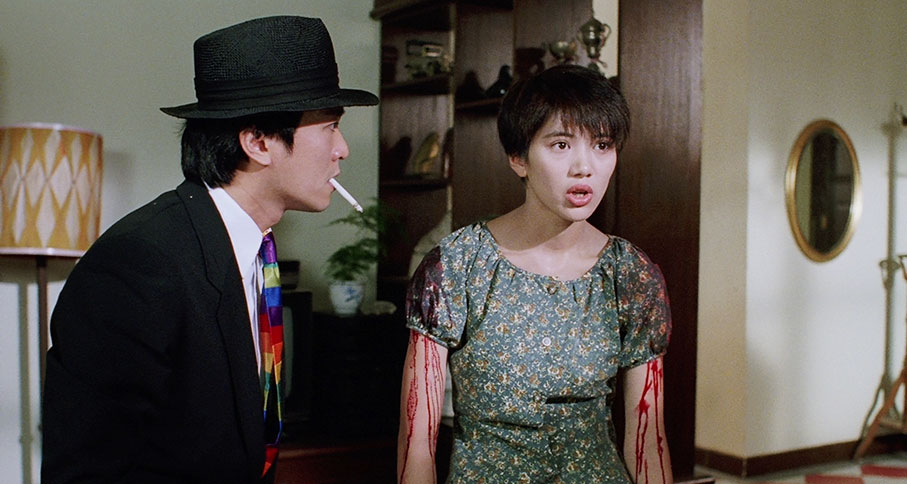
If this seems like a lot of plot, be aware that we're fewer than twenty minutes in and still effectively on setup, though it won't take a visionary to predict that after trying unsuccessfully to kill 007, the pretty Heung-kam will eventually start falling for her target. Knowing that this is coming does the film absolutely no harm, as its uncomplicated plot is really just a hook on which to hang a whole string of often Bond-related or Bond-inspired gags. Not all of them work and a couple fall flat, but many, many more really tickle the funny bone and a fair few had me laughing out loud. A metal-toothed villain (Joe Cheng Cho) is clearly based on Jaws from The Spy Who Loved Me and whose mechanical arm is straight out of The Terminator, Heung-kam's first attempt to kill 007 with his own gun literally backfires twice because the weapon alternately shoots backwards and forwards and given the money to buy some appropriate clothes for his mission, 007 picks a tie that has more bright colours than even the most luminous LGBTQ flag. His attempt to look smooth to Heung-kam sees him kit himself out with blue boxer shorts, an open smoking jacket, end-of-nose sunglasses and a curvy calabash pipe and rolling a pair of baoding balls in his hand like one of the key villains in Jeong Chang-hwa's King Boxer. His attempt to urgently draw and point his gun results in an hilarious piece of bumbling weapon juggling worthy of top-of-his-game Jackie Chan.
The film is also not without its content surprises. It's certainly a lot bloodier than the average Bond, and there's a mall robbery by an armed gang whose boss 007 has inadvertently befriended where the violence and the amoral actions of the criminals are genuinely jarring. Perhaps the most outrageously funny sequence occurs after 007 has taken a bullet high up in his inner left that he asks Heung-kam to dig out with a hammer and a screwdriver. Before she starts, he hands her a pornographic VHS tape for him to watch while she performs the operation, which he claims is to "divert the eyes, distract the heart," but it also helps him to minimise blood loss by diverting as much as possible into his resulting erection. There's a really nice gag built around 007's skill with throwing knives where what looks like a hopeless miss is later revealed to be anything but, and a very funny sequence in which he and several others are facing execution by firing squad and his improvised escape plan is effectively stolen and upstaged by a fellow prisoner (played by co-director Lee Lik-chi), whose spectacular departure is brought to a hilariously unexpected end. Even the sillier gags are sometimes irresistibly funny, as when 007 insists on breaking into an garden party to obtain information by launching himself a couple of hundred metres into the air with his 'Samsomight' briefcase, only to land back on the spot from which he started, and then violently into a wall on his second attempt (a third spin on the gag that sees him propelled such a distance that he has to return by taxi was cut from the film but is pleasingly included in the end credits).
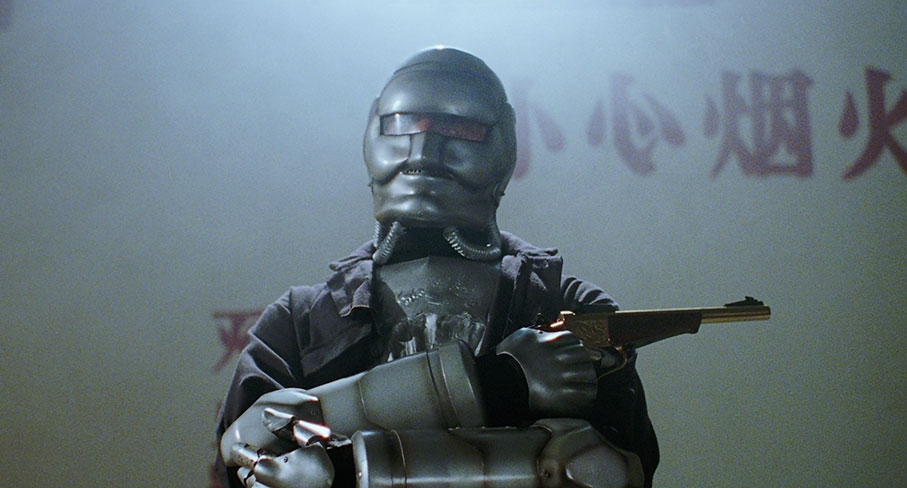
From Beijing with Love was Stephen Chow's directorial debut, and although here he was working with a more experienced co-director, many of the elements that define his later work are incorporated here. His talent for playing a bumbler with powerful hidden talent (here, his almost superhuman skill with throwing knives) makes it easy to warm to 007 even when he is behaving like a self-important twit, while Chow's eye for visual gags and willingness to blend lowbrow and highbrow comedy to create a kind of sophisticated silliness makes for consistently enjoyable viewing. Unsurprisingly, those who know their Bond movies are going to get more from the referential jokes, and I gather that there are also verbal gags that only Cantonese speakers will have a chance of understanding, but the film is in no way completely reliant on them and treats them instead as ingredients in a multi-flavoured comedy banquet. It's daft, very occasionally a tad infantile, but also often whip-smart and so good natured that it really is nigh-on impossible to resist. And when it's funny, it's really funny, and intermittently had me roaring with laughter, and isn't that what you want from a comedy of any description?
Framed in its original aspect ratio of 1.85:1, the 1080p transfer on Eureka's Blu-ray is as close to pristine as you could hope for. Detail is sharply rendered and kept clear by an evenly balanced contrast ratio that nails the black levels without swallowing picture information in the darker areas (the clarity of Lee Kin-keung and Tom Lau's lighting camerawork really helps here). The film's lively colour palette colour is handsomely presented, being really vibrant on the brighter hues without feeling over-saturated. A fine film grain is visible, and I don't recall seeing a dust spot or a whiff of damage anywhere. A lovely transfer.
The Cantonese Linear PCM 2.0 mono soundtrack does have some restrictions on the tonal range, but is nowhere near as tinny as the tracks on some of the Hong Kong martial arts films from the 1970s and 80s, and the dialogue, effects and music are always clear and distortion free. As with the image, there is no obvious evidence of wear or damage.
Also included is a Linear PCM mono 2.0 English language dub, and in terms of audio quality, it does just have the edge on the Cantonese track, particularly in the tonal range of the voices. While the spoken dialogue on the Cantonese track is delivered largely by the original actors and thus matches the characters and what their mouths are doing when they speak, however, some of the voices on the English dub are comically mismatched to the characters and never come close to matching their mouth movements. Although also post-dubbed, the Cantonese track does have a recorded-on-location feel, while the English dub too often feels like what it is, a script read out by voice artists standing in front of a studio mic. As so often with such dubs, the dialogue has also undergone some creative alterations. If you want to see how the dialogue differs between the two tracks – after having first watched the film in is original Cantonese a couple of times, of course – try viewing it with the English dub selected and the English subtitles for the Cantonese track activated.
Audio Commentary by Frank Djeng
Asian film expert and programmer Frank Djeng once again proves to be a bookstore's worth of information on the film, the actors and the filmmakers, as well as being on hand to explain localised elements for us non-Cantonese speakers who are not steeped in Hong Kong and Chinese culture and political history. He reveals, for instance, that the reason Tat Man-sai dislikes his name being shortened to 'man-sai' is because this means 'smelling vagina' in Cantonese, and also informs us that the porn film 007 watches to distract him is Educating Mandy starring the then still under-age Traci Lords. He picks up on all of the Bond and Wong Kar-wai references, as well as links to literature, music and other movies that I was unaware of, and reveals that the film's digs at mainland China saw it banned there, eventually finding a Chinese audience thanks to DVD and streaming. Djeng talks at a dizzying speed, and so there's loads more here of interest.
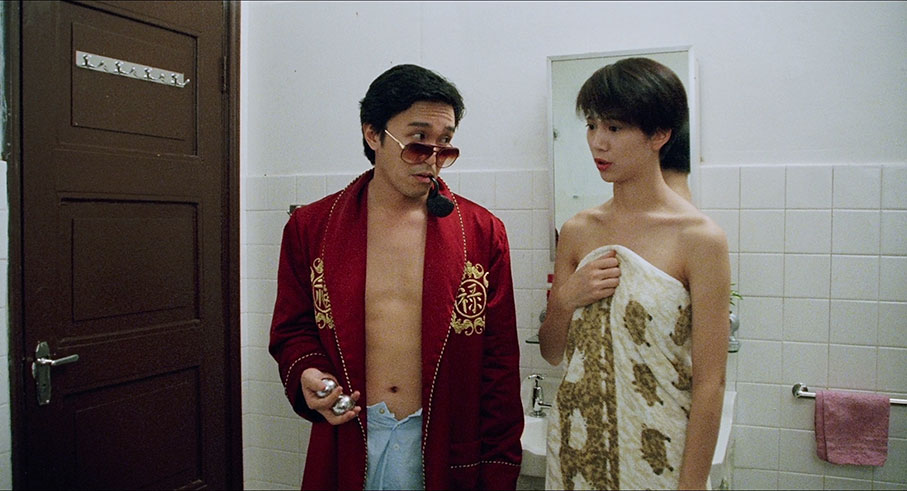
Wong Kam on 'From Beijing with Love' (21:57)
Actor Wong Kam, who plays Commander Yuen in From Beijing with Love, is interviewed by Frank Djeng about his experience working on the film and with Stephen Chow, who Wong says surprised him at their first meeting by arriving on a bus without an entourage like an ordinary guy, in spite of his fame. His faith in the filmmakers is illustrated by the reason he gives for never watching dailies – "Why the hell do you need to watch it if the director's already OK with it?" he says as if stating the obvious. He praises the film's anti-corruption subtext, and while he recalls much about the film's making, at one point he responds to questions Djeng asks about some of his dialogue by laughing and replying, "Did I say that?" He ends by praising his director and fellow actor further – "Stephen Chow was a miracle," he says sincerely, "and you can't have too many miracles." The interview is conducted in Cantonese with (optional) English subtitles, which were also the work of Frank Djeng.
Wong Kam on his career (54:07)
This is an interesting special feature, though there's an argument for suggesting that it doesn't really belong here but on Eureka's earlier Blu-ray release of director Ringo Lam's 1994 Burning Paradise [Huo shao hong lian si], but I'm guessing this was filmed after that disc was released. If you have that release, consider this an extra bonus feature, though if you don't and you've not seen Burning Paradise, then much of the discussion here may feel just a little abstract. Filmed at the same time as the above-detailed interview, this almost hour-long chat has Wong Kam talking about he made his way into acting via art direction, before moving on to Ringo Lam and Burning Paradise, to which the lion's share of the interview is dedicated. Djeng's questions tend to focus on aspects of the film that really do require familiarity with it to appreciate, something reflected in the on-screen title of this special feature, Wong Kam on his career, Ringo Lam and 'Burning Paradise' (the above, as ever, is the title that appears on the disc menu). From Beijing with Love barely gets a mention. The interview is still of real interest – Kam's amused response to one of Djeng's more in-depth questions – "How many times have you watched this film? My God!" – made me smile – but personally I'd watch Lam's film first (the Eureka disc comes heartily recommended) and then come back to this one. If you've already done seen the film, this is a most worthwhile watch.
Archival Lee Lik-chi interview (24:57)
An informative 2005 interview by Frédéric Ambroisine with From Beijing with Love co-director Lee Lik-chi, who looks back at his early film career before moving on to his collaboration with Chow on this movie. He suggests that while Chow was the lead creative on set, the planning and shooting of the film was largely down to him, although the two would often collaborate on devising the on-screen gags. He introduced me to the term 'mo lei tau', a form of nonsensical humour that is specific to modern Hong Kong cinema, and explains why he ended up playing a brief but memorable supporting role in the film. The interview is conducted in Cantonese with fixed English subtitles.
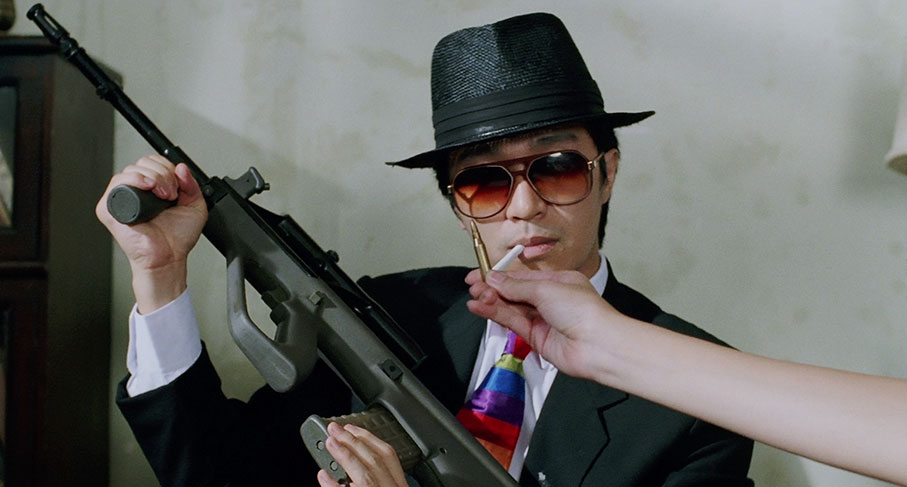
Original Theatrical Trailer (2:59)
The original Hong Kong trailer is a little slicker than many of its ilk, and while lacking any real structure, its choice of clips does include enough of the good gags to make you want to see the rest, so job done I'd say.
Booklet
The meat of this 20-page booklet is an enjoyable and detailed essay on the film by film critic and historian James Oliver, one that again (this keeps happening) highlights several of the very same aspects of the film that I'd also written about when I sat down to read this. Honest, guv! Main credits for the film and viewing notes are also included, including a useful bit of advice for those of us with 4K screens.
A knowingly silly film that's silly in creative and entertaining ways, and is often a lot smarter – not to mention more violent and more suggestive – than its more innocent early gags might suggest. Brimming with energy, it's a treat for those who know their Bond movies and Hong Kong cinema and can spot all the parodies, but still has enough non-referential gags (including a most unexpected but irresistibly funny moment when Chow switches momentarily from Cantonese to English to sarcastically say, "Oh yes, well, I'm sorry…") to have keep most receptive viewers amused. Fans of Chow's later comedy action works should have a ball here. The presentation of the film on this Blu-ray is excellent, and the special features are top-notch, even if one of them would sit more comfortably on a different disc. Warmly recommended.
|